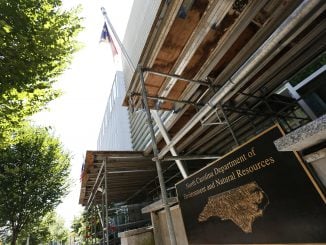
Raleigh – A challenge filed Tuesday against Governor Roy Cooper’s Department of Environmental Quality alleges that the four permits issued by the state for the Atlantic Coast Pipeline “did not meet proper procedure resulting in harm to water quality.”
The petition was filed by Francis DeLuca, former head of the conservative Civitas Institute, and contests permits and approvals recently issued by DEQ to the ACP project, including the federal Clean Water Act Section 401 Certification which is the primary approval required for the project to move forward. The petition also challenges the sedimentation control permit and storm water permits in Nash and Cumberland counties. DEQ confirmed that the agency’s general counsel has received the petition and is reviewing it.
“These permits are required under our laws to assure projects such as this one are built in a way that protects our water quality,” said Thomas Lindgren, attorney for DeLuca. “Contemporaneously with these approvals, this administration announced the establishment of an extra-regulatory fund of $58 million funded by the project owners but controlled by the governor; the same governor oversees implementation of the permitting programs that regulate this project. Our client is concerned that such an arrangement might have corrupted the review process and we have indications that the process was indeed not proper. Rather than take a chance with North Carolina’s water quality, our client is seeking judicial review.”
The challenge comes amid more questions from lawmakers about the timing of those permits being issued. They came the day after Cooper announced a $57.8 million mitigation fund with money from Dominion Energy and Duke Energy. The fund was outlined in a Memo of Understanding released by the governor’s office earlier this month. The memo says that the money would be controlled by the governor and distributed through a board that Cooper appointed to environmental and economic development projects in the eight counties through which the natural gas pipeline will run.
The N.C. General Assembly objected, with some calling it the governor’s “slush fund,” and said that the state budgeting process is the proper avenue for the money. Lawmakers passed H.B. 90 two weeks ago which instead sent the money to the school systems in those eight counties.
“Gov. Cooper’s deal looks like a payment-for-permit and doesn’t pass the smell test, and the right thing to do is to take this ‘voluntary contribution’ to the state and use it to fund the educational needs of children in the poor, rural communities impacted by the Atlantic Coast Pipeline,” said Senate Majority Leader Harry Brown (R-Onslow), after Cooper signed H.B. 90.
Cooper has openly criticized lawmakers for their public objections to the fund saying that they are putting the $57.8 million in jeopardy.
“The legislature has imperiled an agreement with the Atlantic Coast Pipeline to invest in economic development and environmental protections in eastern N.C. Instead the legislators manufactured a power struggle about a pipeline that they said they wanted,” said Cooper when he signed the bill.
Monday’s challenge claims that DEQ didn’t follow the proper procedures in issuing the permits, opening the door to more questions about the process by which the environmental agency reached the conclusions to award the permits. Cooper and his administration have repeatedly stated that the $57.8 million fund was a voluntary contribution by the pipeline and its primary stakeholders, Duke Energy and Dominion Energy. So far, Duke and Dominion have not publicly stated whether the agreement was voluntary.
“As part of the approval process, we worked with all three states through which the pipeline passes to develop mitigation measures for these impacts,” said Duke Energy’s communications spokesperson, Tammie McGee in an email. “In North Carolina, a memorandum of understanding was developed as part of this mitigation process. The State determines how to administer those mitigation funds. Ultimately, the Atlantic Coast Pipeline will grow North Carolina’s economy, produce cleaner energy, and lower energy costs for consumers and businesses across the region.”
On Tuesday, DEQ announced that it was issuing an air quality permit for the Northampton Compressor Station of the ACP project. The permit was green-lighted after revisions were made to the original draft permit based on public comment and additional analysis of projected emissions from the station. That air quality permit was not contested in the petition.



